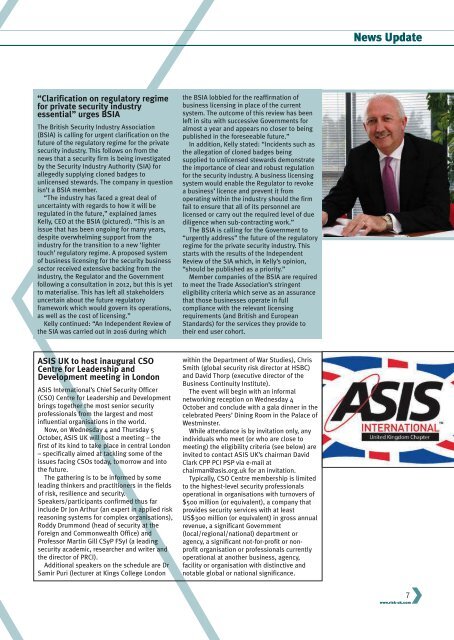RiskUKAugust2017
You also want an ePaper? Increase the reach of your titles
YUMPU automatically turns print PDFs into web optimized ePapers that Google loves.
News Update<br />
“Clarification on regulatory regime<br />
for private security industry<br />
essential” urges BSIA<br />
The British Security Industry Association<br />
(BSIA) is calling for urgent clarification on the<br />
future of the regulatory regime for the private<br />
security industry. This follows on from the<br />
news that a security firm is being investigated<br />
by the Security Industry Authority (SIA) for<br />
allegedly supplying cloned badges to<br />
unlicensed stewards. The company in question<br />
isn’t a BSIA member.<br />
“The industry has faced a great deal of<br />
uncertainty with regards to how it will be<br />
regulated in the future,” explained James<br />
Kelly, CEO at the BSIA (pictured). “This is an<br />
issue that has been ongoing for many years,<br />
despite overwhelming support from the<br />
industry for the transition to a new ‘lighter<br />
touch’ regulatory regime. A proposed system<br />
of business licensing for the security business<br />
sector received extensive backing from the<br />
industry, the Regulator and the Government<br />
following a consultation in 2012, but this is yet<br />
to materialise. This has left all stakeholders<br />
uncertain about the future regulatory<br />
framework which would govern its operations,<br />
as well as the cost of licensing.”<br />
Kelly continued: “An Independent Review of<br />
the SIA was carried out in 2016 during which<br />
the BSIA lobbied for the reaffirmation of<br />
business licensing in place of the current<br />
system. The outcome of this review has been<br />
left in situ with successive Governments for<br />
almost a year and appears no closer to being<br />
published in the foreseeable future.”<br />
In addition, Kelly stated: “Incidents such as<br />
the allegation of cloned badges being<br />
supplied to unlicensed stewards demonstrate<br />
the importance of clear and robust regulation<br />
for the security industry. A business licensing<br />
system would enable the Regulator to revoke<br />
a business’ licence and prevent it from<br />
operating within the industry should the firm<br />
fail to ensure that all of its personnel are<br />
licensed or carry out the required level of due<br />
diligence when sub-contracting work.”<br />
The BSIA is calling for the Government to<br />
“urgently address” the future of the regulatory<br />
regime for the private security industry. This<br />
starts with the results of the Independent<br />
Review of the SIA which, in Kelly’s opinion,<br />
“should be published as a priority.”<br />
Member companies of the BSIA are required<br />
to meet the Trade Association’s stringent<br />
eligibility criteria which serve as an assurance<br />
that those businesses operate in full<br />
compliance with the relevant licensing<br />
requirements (and British and European<br />
Standards) for the services they provide to<br />
their end user cohort.<br />
ASIS UK to host inaugural CSO<br />
Centre for Leadership and<br />
Development meeting in London<br />
ASIS International’s Chief Security Officer<br />
(CSO) Centre for Leadership and Development<br />
brings together the most senior security<br />
professionals from the largest and most<br />
influential organisations in the world.<br />
Now, on Wednesday 4 and Thursday 5<br />
October, ASIS UK will host a meeting – the<br />
first of its kind to take place in central London<br />
– specifically aimed at tackling some of the<br />
issues facing CSOs today, tomorrow and into<br />
the future.<br />
The gathering is to be informed by some<br />
leading thinkers and practitioners in the fields<br />
of risk, resilience and security.<br />
Speakers/participants confirmed thus far<br />
include Dr Jon Arthur (an expert in applied risk<br />
reasoning systems for complex organisations),<br />
Roddy Drummond (head of security at the<br />
Foreign and Commonwealth Office) and<br />
Professor Martin Gill CSyP FSyI (a leading<br />
security academic, researcher and writer and<br />
the director of PRCI).<br />
Additional speakers on the schedule are Dr<br />
Samir Puri (lecturer at Kings College London<br />
within the Department of War Studies), Chris<br />
Smith (global security risk director at HSBC)<br />
and David Thorp (executive director of the<br />
Business Continuity Institute).<br />
The event will begin with an informal<br />
networking reception on Wednesday 4<br />
October and conclude with a gala dinner in the<br />
celebrated Peers’ Dining Room in the Palace of<br />
Westminster.<br />
While attendance is by invitation only, any<br />
individuals who meet (or who are close to<br />
meeting) the eligibility criteria (see below) are<br />
invited to contact ASIS UK’s chairman David<br />
Clark CPP PCI PSP via e-mail at<br />
chairman@asis.org.uk for an invitation.<br />
Typically, CSO Centre membership is limited<br />
to the highest-level security professionals<br />
operational in organisations with turnovers of<br />
$500 million (or equivalent), a company that<br />
provides security services with at least<br />
US$300 million (or equivalent) in gross annual<br />
revenue, a significant Government<br />
(local/regional/national) department or<br />
agency, a significant not-for-profit or nonprofit<br />
organisation or professionals currently<br />
operational at another business, agency,<br />
facility or organisation with distinctive and<br />
notable global or national significance.<br />
7<br />
www.risk-uk.com

















